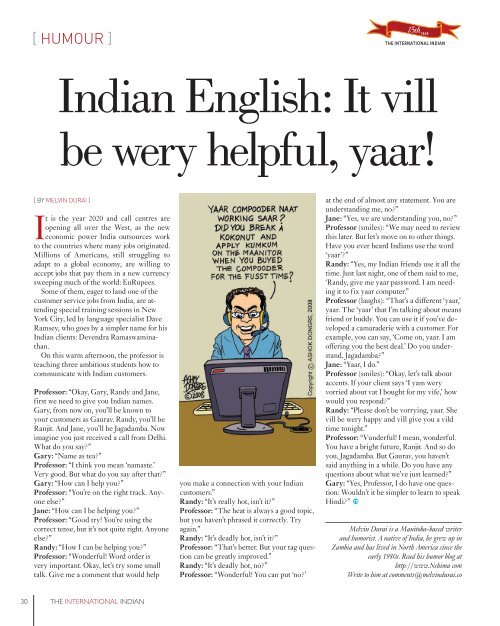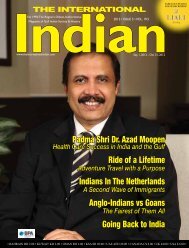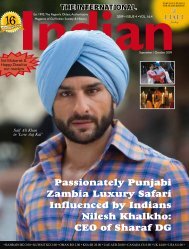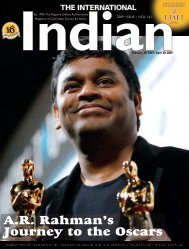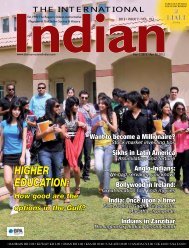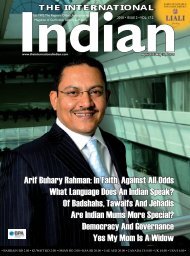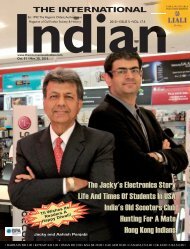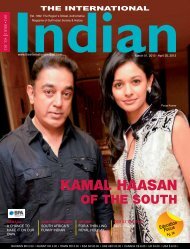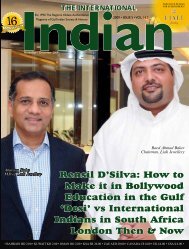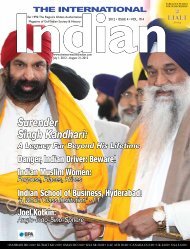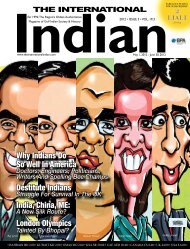THE BUSINESS OF EDUCATION - International Indian
THE BUSINESS OF EDUCATION - International Indian
THE BUSINESS OF EDUCATION - International Indian
You also want an ePaper? Increase the reach of your titles
YUMPU automatically turns print PDFs into web optimized ePapers that Google loves.
[ HUMOUR ]<br />
<strong>Indian</strong> English: It vill<br />
be wery helpful, yaar!<br />
[ By MELVIN DURAI ]<br />
It is the year 2020 and call centres are<br />
opening all over the West, as the new<br />
economic power India outsources work<br />
to the countries where many jobs originated.<br />
Millions of Americans, still struggling to<br />
adapt to a global economy, are willing to<br />
accept jobs that pay them in a new currency<br />
sweeping much of the world: EuRupees.<br />
Some of them, eager to land one of the<br />
customer service jobs from India, are attending<br />
special training sessions in New<br />
York City, led by language specialist Dave<br />
Ramsey, who goes by a simpler name for his<br />
<strong>Indian</strong> clients: Devendra Ramaswaminathan.<br />
On this warm afternoon, the professor is<br />
teaching three ambitious students how to<br />
communicate with <strong>Indian</strong> customers.<br />
Professor: “Okay, Gary, Randy and Jane,<br />
first we need to give you <strong>Indian</strong> names.<br />
Gary, from now on, you’ll be known to<br />
your customers as Gaurav. Randy, you’ll be<br />
Ranjit. And Jane, you’ll be Jagadamba. Now<br />
imagine you just received a call from Delhi.<br />
What do you say?”<br />
Gary: “Name as tea?”<br />
Professor: “I think you mean ‘namaste.’<br />
Very good. But what do you say after that?”<br />
Gary: “How can I help you?”<br />
Professor: “You’re on the right track. Anyone<br />
else?”<br />
Jane: “How can I be helping you?”<br />
Professor: “Good try! You’re using the<br />
correct tense, but it’s not quite right. Anyone<br />
else?”<br />
Randy: “How I can be helping you?”<br />
Professor: “Wonderful! Word order is<br />
very important. Okay, let’s try some small<br />
talk. Give me a comment that would help<br />
you make a connection with your <strong>Indian</strong><br />
customers.”<br />
Randy: “It’s really hot, isn’t it?”<br />
Professor: “The heat is always a good topic,<br />
but you haven’t phrased it correctly. Try<br />
again.”<br />
Randy: “It’s deadly hot, isn’t it?”<br />
Professor: “That’s better. But your tag question<br />
can be greatly improved.”<br />
Randy: “It’s deadly hot, no?”<br />
Professor: “Wonderful! You can put ‘no?’<br />
at the end of almost any statement. You are<br />
understanding me, no?”<br />
Jane: “Yes, we are understanding you, no?”<br />
Professor (smiles): “We may need to review<br />
this later. But let’s move on to other things.<br />
Have you ever heard <strong>Indian</strong>s use the word<br />
‘yaar’?”<br />
Randy: “Yes, my <strong>Indian</strong> friends use it all the<br />
time. Just last night, one of them said to me,<br />
‘Randy, give me yaar password. I am needing<br />
it to fix yaar computer.”<br />
Professor (laughs): “That’s a different ‘yaar,’<br />
yaar. The ‘yaar’ that I’m talking about means<br />
friend or buddy. You can use it if you’ve developed<br />
a camaraderie with a customer. For<br />
example, you can say, ‘Come on, yaar. I am<br />
offering you the best deal.’ Do you understand,<br />
Jagadamba?”<br />
Jane: “Yaar, I do.”<br />
Professor (smiles): “Okay, let’s talk about<br />
accents. If your client says ‘I yam wery<br />
vorried about vat I bought for my vife,’ how<br />
would you respond?”<br />
Randy: “Please don’t be vorrying, yaar. She<br />
vill be wery happy and vill give you a vild<br />
time tonight.”<br />
Professor: “Vunderful! I mean, wonderful.<br />
You have a bright future, Ranjit. And so do<br />
you, Jagadamba. But Gaurav, you haven’t<br />
said anything in a while. Do you have any<br />
questions about what we’ve just learned?”<br />
Gary: “Yes, Professor, I do have one question:<br />
Wouldn’t it be simpler to learn to speak<br />
Hindi?”<br />
Melvin Durai is a Manitoba-based writer<br />
and humorist. A native of India, he grew up in<br />
Zambia and has lived in North America since the<br />
early 1980s. Read his humor blog at<br />
http://www.Nshima com<br />
Write to him at comments@melvindurai.co<br />
30<br />
<strong>THE</strong> INTERNATIONAL INDIAN


